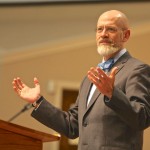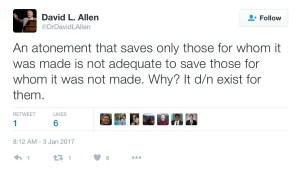Let’s think about Dr. Allen’s claim here: there is an obvious presupposition that needs to be exposed and challenged. First, not those who are not His sheep. The once-for-all (temporal, not distributive use) sacrifice perfects those for whom it is made. The Father gives a specific people to the Son, the Son’s death brings about the salvation of each and every one of them, without fail (John 6:39). So there is harmony and consistency between the intention and will of the Father in the salvation of the elect, and the work of the Son in being personally united to the elect so that His death is their death, His resurrection their resurrection. Of course, if such a harmony exists, there is no room for the centerpiece of the synergistic universe: the autonomous will of the creature, man. So this consistency, this harmony, must be denied.
Next, note the assertion “is not adequate to save those for whom it was not made.” See the poorly hidden assumption? Why would the atonement have an intention other than that which is consistent with the actions of each of the members of the Godhead in their work of redemption? Why would the atonement have a different scope and purpose than that redemptive will of the Father? (Which is why synergists must assert a universal *redemptive* will of the Father and deny the specificity of the elect). In other words, why would the Father make personal, effective provision through union with the Son for those who will remain justly under His wrath? The assumption here is that there is some kind of justice issue involved *in the extension of grace* and that if the Father does not make *equal salvific provision* for each and every person, He is unjust. So make sure to note what this means: grace cannot be free, cannot be specific, cannot actually save—this is the watchword of the synergist, whether Roman or non. 
Allen is playing on the discussion of term “adequacy” in reference to the atonement, confusing, as almost all synergists and universal atonement advocates do, the fact that there is no inherent limitation upon the *efficacy* of the atonement with the reality that the atonement is purposeful and harmonious with the election of the Father and the application of the Spirit (harmonious action of the Triune God). The idea is to place in the mind of the reader the false suggestion that by making the atonement consistent with the decree of election and the application by the Spirit we are introducing a fundamental *flaw* or *weakness* or *limitation* in the atonement’s power, when in reality, just the opposite is the case. Once we realize what the atonement is (a true propitiatory sacrifice) and once we realize how the Son is doing the will of the Father in the salvation of the elect, we see not only the atonement’s great power and perfection, we also see the grave dangers that flow necessarily from the synergistic viewpoint that renders the atonement potential, impersonal, and theoretical.

